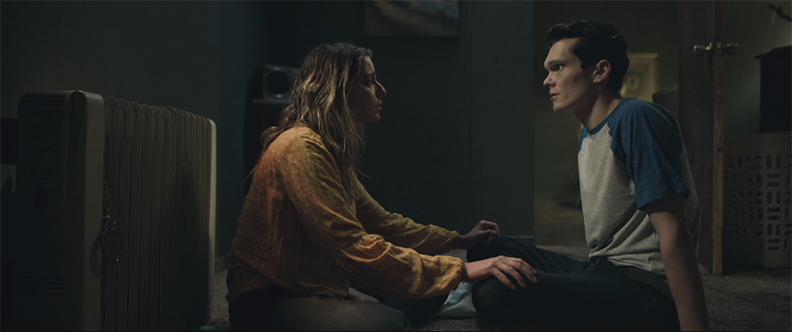
A Nightmare That Feels Too Real
No Tears in Hell
MOVIE REVIEW
No Tears in Hell
-
Genre: Horror, True Crime, Thriller
Year Released: 2025
Runtime: 1h 45m
Director(s): Michael Caissie
Writer(s): Michael Caissie, Alexander Nistratov
Cast: Luke Baines, Gwen Van Dam, Tatjana Marjanovic, Audrey Neal, Gabriella Westwood, Erik Fellows, Princess Elmore, Gary Kasper, Kathy Butler Sandvoss, Michelle Pokopac
Where to Watch: arriving on VOD, digital on August 12, 2025
RAVING REVIEW: Some horror films seek to get you through tension and jump scares. Others aim to disturb, to burrow under your skin and sit there. NO TEARS IN HELL does the latter—unflinchingly. Writer/director Michael Caissie’s dramatization of Russian serial killer Alexander Spesivtsev’s crimes is as brutal as it is cold. This isn’t a stylized slasher. It’s a grim, deliberately paced nightmare that swaps sensationalism for discomfort, inviting viewers into a world where evil isn’t theatrical—it’s mundane and methodical.
Set in the isolation of an Alaskan winter, the film reimagines Spesivtsev’s crimes in a U.S. setting, trading Siberian apartment blocks for a snow-covered house of horrors. Luke Baines plays Alex, a seemingly quiet young man whose demeanor hides an eruptive sadism. Alongside him is his enabling mother—portrayed with an unexpecting calm by Gwen Van Dam—who not only tolerates her son’s crimes but participates in covering them up. It’s this relationship that makes the film truly unsettling. The horror isn’t just in what’s done—but in how normalized it becomes between them.
Van Dam’s performance is deceptively restrained, chilling in its casual cruelty. Whether she’s justifying cannibalism or cleaning up a murder scene, she plays the role with a disturbing lack of urgency, reinforcing the horror of generational complicity. Baines, meanwhile, walks a careful line. His Alex is neither monster nor misunderstood victim. He’s something worse: a hollow shell going through the motions of evil without remorse or pleasure—just because he can. The performance never reaches camp, which makes it even more disturbing.
What the film does right—perhaps too well—is force the viewer to sit with the violence. While it begins with implied horror, things escalate quickly into scenes of graphic, nearly clinical brutality. Whether through forced mutilation or implied necrophilia, the film spares no detail. However, what makes it particularly harsh is the lack of fanfare it offers. The camera doesn’t gloat. It just observes. Combined with a sterile sound design that emphasizes the sounds of flesh, bone, and breath, the effect is quietly devastating.
Caissie’s direction shows restraint in key moments, even as the violence ramps up. The visuals, painted in muted tones of blue and gray, evoke an endless, frozen purgatory. It’s not flashy, but that’s by design. There’s no stylish kills here, no cat-and-mouse chase with clever quips—just a slow descent into the everyday horror of what happens when no one intervenes.
The supporting cast is strong across the board, particularly the victims. Their performances elevate the film’s intensity without veering into melodrama. Scenes of suffering are excruciating not because of gore, but because the fear feels so real. There’s a remarkable focus on how the violence affects the victims—not just physically, but psychologically. These moments are arguably the film’s most affecting and hardest to watch.
The film’s unrelenting grimness borders on numbing by its final act. With little variation, even the most shocking scenes start to blur together. There’s also a lingering question of purpose. Does the film transcend mere horror to convey a deeper meaning? Is it a cautionary tale? A statement on trauma? Or simply a faithful adaptation of monstrous events?
To its credit, the film doesn’t attempt to offer easy answers. It refuses to let audiences feel a sense of closure. The ending isn’t a release—it’s a quiet, echoing silence, as if the camera is still watching long after we’ve looked away. It’s rare for a horror film to sidestep redemption completely, but NO TEARS IN HELL seems to believe that some things can’t be cleansed, only exposed.
As for the true story, while the real Spesivtsev operated in 1990s Russia, the film’s relocation to Alaska doesn’t diminish the horror. If anything, the remote setting enhances the sense of isolation. Though many liberties are taken—including fictionalized victims and altered timelines—the film remains rooted in the same existential terror: that evil can grow quietly in forgotten places, behind doors no one dares to open.
The film won’t be for everyone. It’s grim, aggressive, and emotionally exhausting. But for viewers seeking a film that doesn’t sugarcoat human depravity, NO TEARS IN HELL is one of the more memorable entries in the true crime horror subgenre. It’s a film that looks you dead in the eye and refuses to flinch—even when you do.
Please visit https://linktr.ee/overlyhonestr for more reviews.
You can follow me on Letterboxd, Instagram, Twitter, and YouTube. My social media accounts can also be found on most platforms by searching for 'Overly Honest Reviews'.
I’m always happy to hear from my readers; please don't hesitate to say hello or send me any questions about movies.
[photo courtesy of BULLDOG BROTHERS ENTERTAINMENT, TADROSS MEDIA GROUP, SCATENA & ROSNER FILMS]
DISCLAIMER:
At Overly Honest Movie Reviews, we value honesty and transparency. Occasionally, we receive complimentary items for review, including DVDs, Blu-rays, CDs, Vinyl Records, Books, and more. We assure you that these arrangements do not influence our reviews, as we are committed to providing unbiased and sincere evaluations. We aim to help you make informed entertainment choices regardless of our relationship with distributors or producers.
Amazon Affiliate Links:
Additionally, this site contains Amazon affiliate links. If you purchase through these links, we may receive a commission. This affiliate arrangement does not affect our commitment to honest reviews and helps support our site. We appreciate your trust and support in navigating these links.